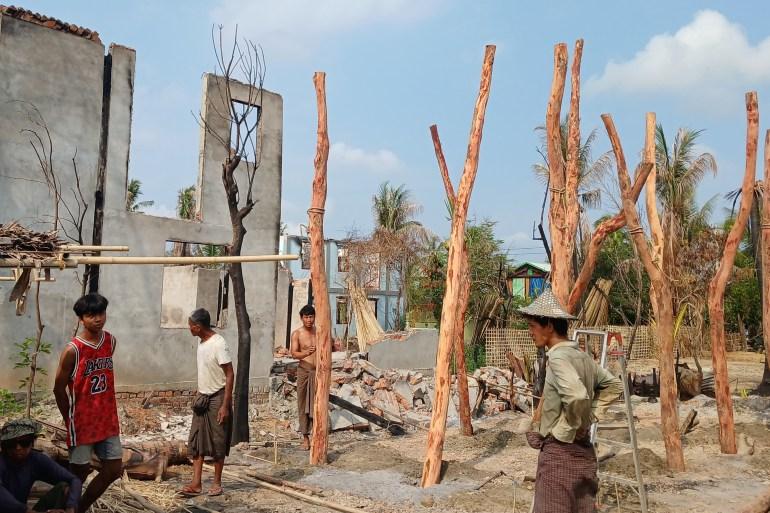Source: ALJAZEERA
ALJAZEERA MEDIA NETWORK

Rohingya and ethnic Rakhine youth face challenges as conflict escalates in Rakhine State.
Since conflict resumed in his native Rakhine State last November, Thura Maung has seen his options narrow.
The 18-year-old, from the state’s ethnic Rakhine majority, first fled his home in the coastal town of Myebon in December, when clashes between the military and autonomy-seeking Arakha Army – formerly known as the Arakan Army – seemed imminent.
He and his family escaped by boat, travelling along river inlets at night to avoid being seen by the military. They returned a few days later, but fled twice more over the following months as the fighting escalated.
By February, the military and AA were battling for control over Myebon, and Thura Maung could hear shelling from the village where he had taken shelter. The military had also blocked the movement of goods and shut down the internet in areas affected by the conflict, leaving his family struggling to make ends meet.
With his university effectively closed due to the fighting, he felt his dreams slipping away. “There were no opportunities for my life to develop, and I saw no future,” he said.
It’s a feeling shared by Zubair, an ethnic Rohingya from Rakhine State’s northern Maungdaw township. The 24-year-old was doing an internship with a civil society organisation focused on peacebuilding when the fighting broke out and his office closed.
Soon, he was running from the war as well as a military conscription drive targeting Rohingya men. “We weren’t able to stay at home, go to work or even sleep on time,” he said. “Time that we could’ve spent working on our futures was wasted.”
Zubair and Thura Maung are part of a new generation of young people across Myanmar whose lives have been turned upside down by the 2021 military coup. In Rakhine State, people had already lived through years of communal conflict and a brutal 2017 military crackdown on the mostly Muslim Rohingya. The escalating violence between the military and AA has only made matters worse, according to Karen Simbulan, a human rights lawyer specialising in conflict sensitivity in Rakhine.
“With the most recent renewed fighting and the looming threat of forced conscription, many who had persisted and stayed in Rakhine despite everything are seeing their futures taken away from them,” she said. “Many are taking significant risks to flee to safety, often putting themselves in highly vulnerable situations just to survive.”
Al Jazeera spoke with four young men from Rakhine State about the effects of the conflict on their lives. They have all been given pseudonyms to protect their safety.
The renewed fighting is the latest crisis to hit Rakhine State, home to various ethnic minorities as well as the mostly Buddhist Rakhine majority. A cyclone hit the region last May, following successive waves of violence in the decade leading up to the coup.
In 2012, mobs of ethnic Rakhine and Rohingya people attacked each other, leaving dozens dead and many forced from their homes. Afterward, the military imposed tough restrictions on Rohingyas’ movement and access to services, while denying them citizenship.
The situation deteriorated dramatically in 2016 and 2017 when the military killed thousands of Rohingya civilians and committed widespread violence following attacks by a Rohingya armed group. The military crackdown drove over 750,000 people into Bangladesh.
The AA stepped up its fight for autonomy in late 2018, leading to intense armed clashes in Rakhine State. The military also bombed civilian areas, committing war crimes.
The military and AA reached an informal ceasefire in November 2020. However, the military seized power and cracked down on protests in 2021, leading to all-out war across the country.
Existing ethnic armed organisations fought alongside anti-coup forces, but the AA mostly focused on governance mechanisms in its territory. In October, the AA joined ethnic armed groups to challenge the military dictatorship, resulting in increased conflict.
The military has retaliated with attacks on civilian areas, displacing thousands of people. The forced conscription of Rohingya men aims to threaten reconciliation efforts between Rakhine and Rohingya communities.
“The military is stirring up communal tensions to divide communities and regain control in Rakhine,” said Simbulan.
Zubair and Thura Maung share experiences of fleeing conflict and facing the fear of military conscription. The turmoil in Rakhine State has disrupted their lives and shattered their hopes for the future.
Tun Tun Win and Arkar Htet, also affected by the conflict, have faced arrests and danger as they navigated through the violence in Rakhine State.
Your email address will not be published. Required fields are marked *